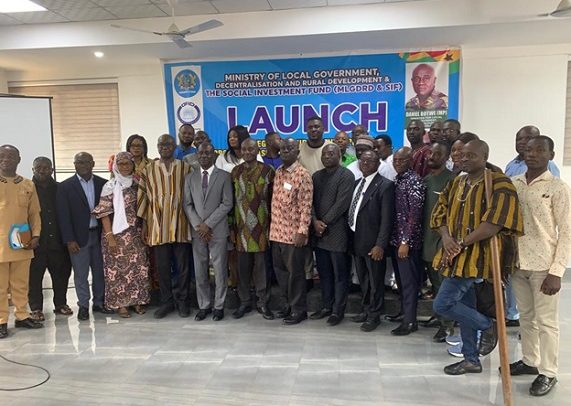Officials at the launch of the RIDP II
The Ministry of Local Government, Decentralisation and Rural Development (MLGDRD) in collaboration with the Social Investment Fund (SIF) have launched the second phase of the Integrated Rural Development Project (RIDP II).
The launch of the RIDP II; a 5-year (2022-2027) agreement with the OPEC Fund for International Development (OFID), follows the successful implementation of the first phase from 2013 to 2019.
The Project has four components including the provision of socio-economic infrastructure, provision of credit to SMES, outreach, sensitization and capacity building and management and coordination.
The IRDP II, OFID Component, will be implemented in 23 districts in the 16 regions to improve the living conditions of rural communities by providing access to basic infrastructure and socio-economic services including health and education, and to ensure sustainable increase in income through the provision of micro-credit to the rural impoverished communities.
Minister for Local Government, Decentralisation and Rural Development, Daniel Botwe, who launched the project in Accra yesterday, said the phase one served 132 communities in 21 districts across the then 10 regions with a population of about 2.3 million.
He indicated that the IRDP II is being funded from a loan facility of USS 24 million comprising $ 20 million from OFID, $ 0.80 million from the Government of Ghana (GoG) and $ 3.2 million from the project beneficiaries.
“The Integrated Rural Development Project Phase One improved access of the rural poor to basic socioeconomic infrastructure; increased agricultural productivity; and households’ incomes,” he said.
Mr. Botwe noted that the goal of IRDP II is to increase resilience of rural communities to the impact of climate change and enhance provision of credit to small and medium scale enterprises (SMEs).
He thus urged the assemblies to take the project seriously as the ministry will exercise its oversight responsibility by demanding status report from the District Chief Executives (DCEs).
“There has been so many interventions in the districts, let this not be one of the usual funfairs but pursue it so at the end of the day, the living standards of the people will be improved,” he said.
Chief Executive Officer of SIF, Justice Mensah Amankwa, said the launch of the second phase marks the continuation of the strong partnership between SIF and the OPEC Fund for International Development and marks the beginning of a new era of cooperation and collaboration.
He indicated that there is an increased demand from poor communities within the poverty pockets of the country for support.
“It has therefore become imperative for us at SIF to implement policies and programmes that will meet the needs of the disadvantaged and thereby increase the scope of opportunities of the ‘unreached poor’ among our people,” he added. “The strategy of the SIF for poverty reduction aligns with the decentralization agenda of the government because, it provides avenues for the government to bring development to the doorsteps of the poor.”
He added that a vibrant rural economy is one of the best guarantees of the long-term success of a decentralized government system where decision-making is district-based and local people have a buy-in as to how their communities are developed.
Director of External Resource Mobilization And Economic Relations Division, Ministry of Finance, Yvonne Quansah in a speech read on her behalf said the essence of IRDP II lies in the resounding success and profound impact of IRDP I on beneficiary districts and rural development as a whole.
“It is in this context that the Integrated Rural Development Phase II finds its relevance as one of the key government’s interventions of enhancing job creation, access to socio-economic infrastructure, and improve livelihoods for sustainable poverty reduction,” she said.
She further indicated that the project will also increase resilience of rural communities to the impact of climate change and enhance provision of input credit to farmers/farmer groups and strengthen institutional capacities in the beneficiary districts.
“It is worth noting that the project is deeply entwined with our nation’s response to the trials posed by the global pandemic. IRDP II finds its roots within the framework of the government’s Post COVID-19 Programme for Economic Growth (PC-PEG).
This blueprint, crafted to navigate the economic crisis that has tested our country, serves as the anchor for IRDP II’s endeavors,” she added.
Ms Quansah indicated that the project also harmonizes seamlessly with the IMF-supported program, designed to restore macroeconomic stability, ensure debt sustainability, and build resilience through far-reaching structural reforms.
“Our rural communities deserve the same opportunities and amenities that urban areas enjoy. Through this project, rural communities will be empowered with improved infrastructure, access to education, health care, and economic opportunities,” she added.
By Jamila Akweley Okertchiri


